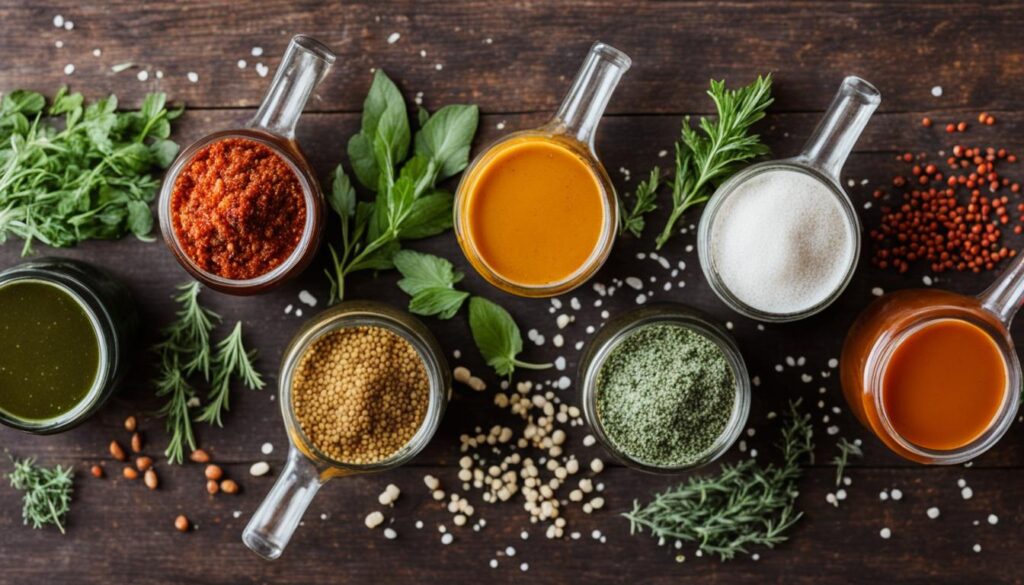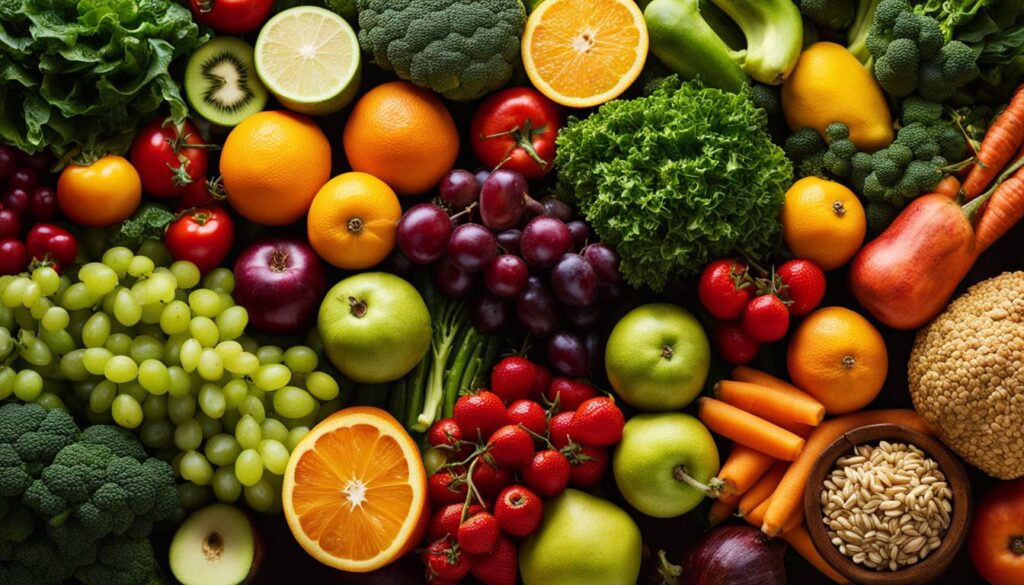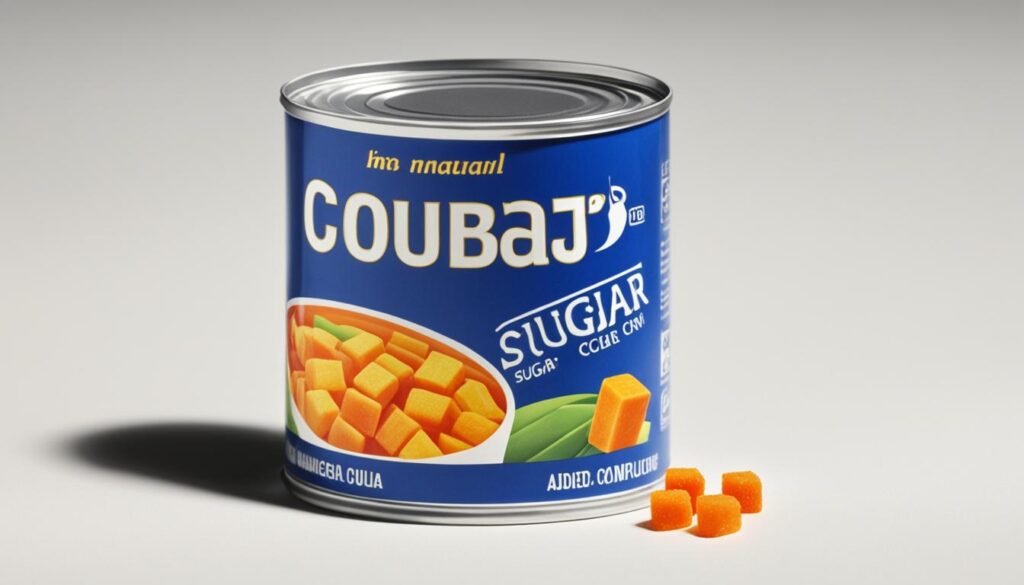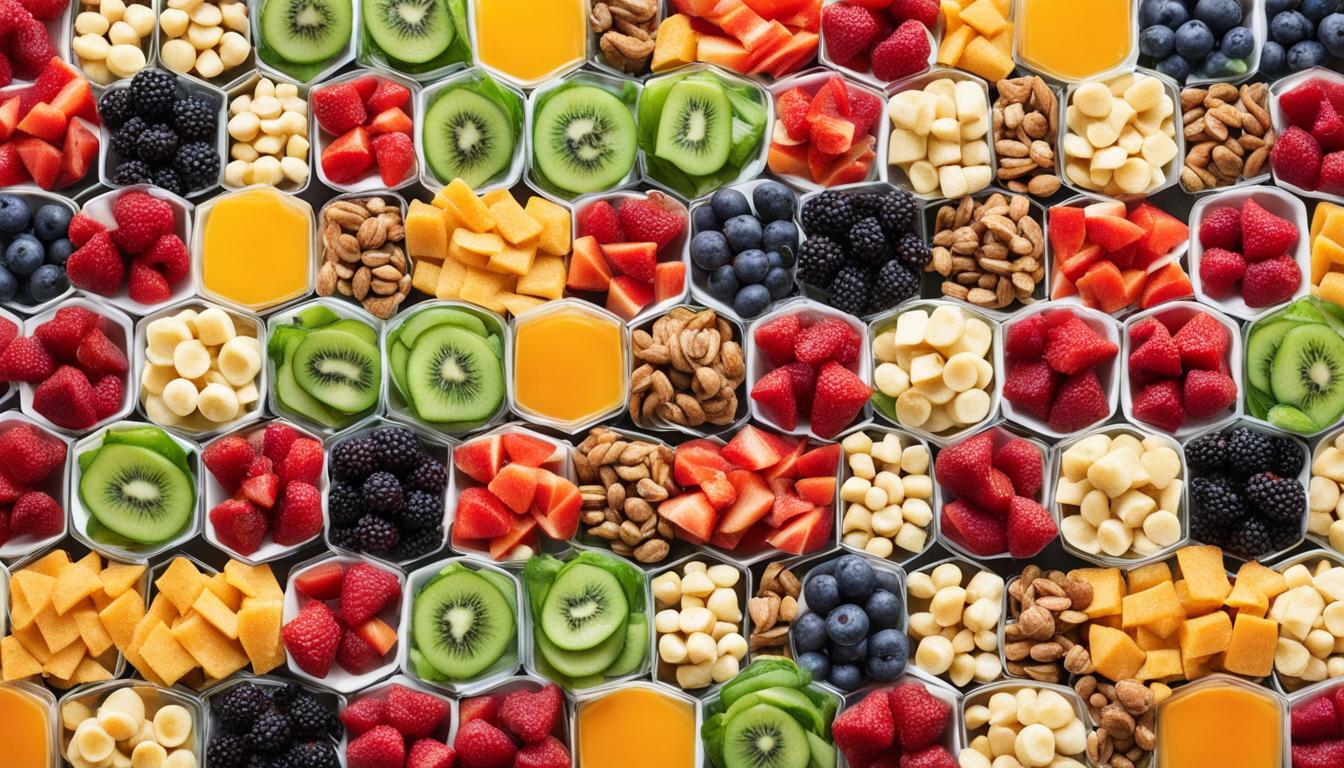Eating too much sugar can have a devastating effect on your health. Not only does it contribute to weight gain, but it also increases the risk of obesity, type 2 diabetes, heart disease, cancer, and tooth decay. Unfortunately, most Americans consume more sugar than their bodies need, often exceeding the recommended daily intake.
If you’re looking to lose weight effectively and maintain a healthy lifestyle, cutting sugar from your diet is a crucial step. Adopting a sugar-free diet can help you reduce cravings, improve your overall well-being, and achieve your weight loss goals.
Reducing your sugar intake may seem daunting at first, but with the right strategies and a few simple lifestyle changes, you can make it a reality. In this article, I will share valuable tips and insights to help you successfully cut sugar and embark on your weight loss journey.
Key Takeaways:
- Consuming too much sugar can have negative effects on your health, including weight gain and increased risk of various diseases.
- Following a sugar-free diet can help reduce sugar cravings and support weight loss.
- Being mindful of hidden sugars in processed foods and drinks is important for effectively cutting sugar.
- Choosing healthier dessert alternatives and sauces can significantly reduce your added sugar intake.
- Opting for whole foods and minimally processed ingredients is key to maintaining a low sugar diet.
Understand the Hidden Sugars in Your Diet
https://www.youtube.com/watch?v=NQ3HFxg_hIo
When it comes to managing our health, one aspect that often gets overlooked is our added sugar intake. Many of us consume more sugar than we realize, as it is often hidden in various foods and beverages. Understanding the sources of hidden sugars is crucial for making informed choices about our diet. In this section, I will delve into the importance of reading product labels, choosing whole foods, and limiting processed foods to reduce our added sugar intake.
Reading product labels
Reading product labels is an essential step in identifying the hidden sugars in our diet. Manufacturers often use different names for added sugars on ingredient lists, making it challenging to identify them. Some common names for added sugars include sucrose, high fructose corn syrup, molasses, and fruit juice concentrates. By familiarizing ourselves with these names and checking the sugar content in the nutrition facts label, we can become more aware of the amount of added sugars in the products we consume.
Choosing whole foods
Opting for whole, natural foods is another effective way to limit our added sugar intake. Whole foods, such as fruits, vegetables, legumes, and unprocessed meats, naturally contain minimal amounts of added sugars. By focusing on these foods, we can enjoy a nutrient-dense diet while reducing our sugar consumption. Additionally, choosing whole foods over processed and low-fat versions can help us avoid hidden sugars commonly found in packaged and convenience foods.
Limiting processed foods
Processed foods are often laden with added sugars. From drinks to sauces to breakfast foods, many processed options contain significant amounts of hidden sugars, contributing to our overall sugar intake. By limiting our consumption of processed foods and opting for homemade alternatives, we can have better control over the amount of added sugars in our diet. Cooking from scratch allows us to use whole ingredients and avoid the unnecessary sugars often found in processed options.
By understanding the hidden sugars in our diet, reading product labels, choosing whole foods, and limiting processed foods, we can take significant steps towards reducing our added sugar intake. Being mindful of our sugar consumption is essential for maintaining a healthy lifestyle and preventing the negative health effects associated with excessive sugar consumption.
Reduce Sugary Drink Consumption

Sugary drinks have become a major contributor to the high levels of added sugars in the American diet. Sodas, sports drinks, and sweetened teas are not only loaded with sugar but also often lack essential nutrients and can be detrimental to weight loss and overall health.
“The excessive consumption of sugary drinks is associated with weight gain, increased risk of obesity, type 2 diabetes, and cardiovascular diseases.”
By cutting back on sugary drinks, you can make significant strides towards achieving your weight loss goals and improving your overall health. Instead of reaching for a can of soda or a sugary bottled tea, consider healthier beverage options that not only quench your thirst but also nourish your body.
Healthier Beverage Options
1. Water: Staying hydrated with plain water is essential for good health. Not only does it have zero calories and no added sugars, but it also helps to flush toxins from your body and keeps your organs functioning optimally.
2. Unsweetened sparkling water: If you crave the fizz of soda, opt for unsweetened sparkling water instead. You can add a squeeze of fresh lemon or lime for a burst of flavor without the added sugars.
3. Herbal teas: Herbal teas are a great option for those looking to cut back on sugary drinks. Not only are they naturally caffeine-free, but they also offer various health benefits depending on the herbs used.
4. Black or green tea: Both black and green teas contain antioxidants and can provide a natural energy boost without the excessive amounts of sugar found in sugary drinks. Remember to enjoy them without added sweeteners or opt for a small amount of natural sweeteners like honey or stevia.
5. Coffee: Coffee can be a healthy beverage option when consumed in moderation. It contains beneficial antioxidants and may even boost metabolism. However, be mindful of adding sugar or flavored syrups that can quickly undo the potential benefits.
By choosing healthier beverage alternatives, you can reduce your sugar intake, support your weight loss efforts, and improve your overall health.
Choose Healthier Dessert Alternatives
https://www.youtube.com/watch?v=FIw5F0LdspM
Most desserts are high in sugar and provide little nutritional value. Consuming them can lead to blood sugar spikes, increased hunger, and further sugar cravings. Opting for healthier dessert alternatives not only satisfies your sweet tooth but also supports your overall well-being. Here are a few delicious options:
Fresh fruit
Enjoy the natural sweetness of fresh fruits like berries, melons, and citrus fruits. They not only provide essential vitamins and minerals but also contain dietary fiber, which helps regulate blood sugar levels and keeps you feeling full.
Greek yogurt with cinnamon or fruit
Swap high-sugar ice creams for Greek yogurt topped with a sprinkle of cinnamon or fresh fruit. Greek yogurt is rich in protein and calcium while being lower in sugar. The addition of cinnamon or fruit adds natural sweetness without the blood sugar spikes.
Baked fruit with cream
Indulge in the sweetness of baked fruit, such as apples or peaches, paired with a dollop of cream. Baking fruit enhances its natural flavors and caramelizes the sugars, creating a satisfying dessert without the need for extra sugar.
Dark chocolate with a high cocoa content
For chocolate lovers, choose dark chocolate with a high cocoa content. Dark chocolate is lower in sugar and contains antioxidants, which have numerous health benefits. Enjoy a small piece as a treat without worrying about significant blood sugar fluctuations.
| Healthier Dessert Alternatives | Nutritional Benefits |
|---|---|
| Fresh fruit | Provides essential vitamins, minerals, and dietary fiber |
| Greek yogurt with cinnamon or fruit | Rich in protein and calcium, lower in sugar |
| Baked fruit with cream | Natural sweetness without added sugars |
| Dark chocolate with high cocoa content | Lower in sugar, rich in antioxidants |
Be Mindful of Added Sugar in Sauces

When it comes to reducing your sugar intake, it’s important to be mindful of the sauces and condiments you use. Many popular sauces, such as ketchup, barbecue sauce, and sweet chili sauce, often contain hidden sugars that can contribute to an increased intake of sugar.
To make healthier choices, opt for sugar-free or no added sugar options. By doing so, you can still enjoy the flavors you love without the unnecessary sugar. Fortunately, there are plenty of alternatives to traditional sugary sauces that can add flavor to your dishes. Consider using herbs, spices, chili, mustard, vinegar, pesto, mayonnaise, or lemon/lime juice as alternative seasonings. These options can help enhance the taste of your meals without adding extra sugar.
Why Choose Sugar-free Seasoning Options?
Choosing sugar-free seasoning options can benefit both your health and your taste buds. Excessive sugar intake is linked to various health issues, including obesity, type 2 diabetes, and heart disease. By reducing your sugar consumption, you can decrease the risk of developing these conditions and improve your overall well-being.
Not only can sugar-free seasoning options help improve your health, but they can also enhance the natural flavors of the foods you consume. Without the overpowering sweetness of added sugars, you can truly savor the taste of fresh ingredients and spices.
Next time you reach for a sauce or condiment, take a closer look at the label and choose options with little or no added sugar. Your body and taste buds will thank you!
| Sauce | Sugar Content | Alternative Seasonings |
|---|---|---|
| Ketchup | 1 tbsp: 4g | Mustard |
| Barbecue Sauce | 1 tbsp: 9g | Smoked Paprika |
| Sweet Chili Sauce | 1 tbsp: 8g | Chili Flakes |
Opt for Full-Fat Foods

When it comes to choosing between low-fat and full-fat options, the decision may not be as straightforward as you think. While low-fat versions of foods like peanut butter, yogurt, and salad dressing are often seen as healthy choices for weight management, they may not always be the best option when it comes to cutting sugar intake.
Low-fat alternatives often contain more sugar than their full-fat counterparts, as well as sometimes more calories. Manufacturers often add sugar to low-fat products to enhance flavor and compensate for the loss of taste and texture that occurs when fat is reduced. This means that even though you may be opting for a low-fat version, you could still be consuming significant amounts of added sugar.
Choosing full-fat foods can be a healthier alternative when trying to cut back on sugar. Full-fat options tend to be more satisfying and can help curb cravings, reducing the likelihood of reaching for sugary snacks later on. However, it’s important to read ingredient lists to ensure that full-fat options are not overly processed or contain other unhealthy additives.
Comparing Sugar Content
Let’s take a look at a comparison between low-fat and full-fat options for three popular food items:
| Food Item | Low-Fat Option | Full-Fat Option |
|---|---|---|
| Peanut Butter | Reduced Fat Peanut Butter | Natural Peanut Butter |
| Yogurt | Low-Fat Yogurt | Full-Fat Yogurt |
| Salad Dressing | Lite Salad Dressing | Full-Fat Salad Dressing |
Please note: Actual sugar content may vary based on brands and specific products.
As you can see, low-fat versions of these foods may have higher sugar content compared to their full-fat counterparts. This is important to consider, especially if you’re trying to reduce your sugar intake. By choosing full-fat options and reading ingredient lists, you can make informed choices that support your health goals.
Embrace a Whole Foods Diet

Eating a diet rich in whole foods can be a powerful strategy for reducing your added sugar intake and promoting overall health. Whole foods, such as fruits, vegetables, legumes, whole grains, and unprocessed meats, are naturally low in added sugars, making them a healthier choice compared to their ultra-processed counterparts.
Ultra-processed foods, on the other hand, often contain high amounts of added sugars. These foods, which typically come packaged and filled with artificial ingredients, can contribute significantly to the added sugar intake in the American diet. By embracing a whole foods diet, you can avoid these hidden sugars and enjoy more nutritious meals.
One of the best ways to incorporate whole foods into your diet is by cooking from scratch. By preparing your meals using fresh, unprocessed ingredients, you have control over the amount of sugar in your food. This also allows you to experiment with different flavors and cooking methods, making your meals more enjoyable.
When grocery shopping, focus on the perimeter of the store, where you’ll find the fresh produce, meat, and dairy sections. Avoid the center aisles, which are typically filled with processed and sugary foods. By filling your cart with whole foods, you’ll be well on your way to reducing your added sugar intake and improving your overall health.
Not only can a whole foods diet help you reduce added sugar intake, but it also provides numerous other health benefits. Whole foods are rich in essential nutrients, fiber, and antioxidants, which can support a healthy immune system, improve digestion, and reduce the risk of chronic diseases.
So, start incorporating whole foods into your meals today! Get creative in the kitchen, experiment with new recipes, and enjoy the natural flavors and goodness that whole foods have to offer. Your body will thank you for it.
– How Does Cutting Sugar Intake Help with Weight Loss?
Cutting sugar intake is crucial for obesity prevention. Excessive sugar consumption leads to weight gain and other health problems. By reducing sugar intake, individuals can better regulate their caloric intake and curb cravings, ultimately aiding in weight loss and maintaining a healthy lifestyle (see my post here).
Understand Sugar Content in Canned Foods

Canned foods are a convenient option for many people due to their long shelf life and easy accessibility. However, it’s important to be aware of the sugar content in canned goods, especially when it comes to fruits and vegetables packed in syrup or with added sugars.
Fruits and vegetables naturally contain sugars, but these sugars are not typically problematic as they do not have the same impact on blood sugar levels as added sugars. However, when fruits are packed in syrup or have added sugars, their sugar content can increase significantly.
When purchasing canned fruits, it’s recommended to opt for lower sugar options. Look for fruits packed in water or those labeled as having no added sugar. This way, you can enjoy the nutritional benefits of fruits without the excessive sugar content.
If you do have canned fruits with added sugar, a simple rinsing can help reduce the sugar content. Rinsing canned fruits can remove excess syrup or juices containing added sugars. This can be done under running water before consuming them.
Remember to read labels and ingredient lists carefully when buying canned fruits. Look out for added sugars listed as ingredients, such as high-fructose corn syrup or cane sugar. By being mindful of the sugar content in canned foods, you can make healthier choices for yourself and your family.
Lower Sugar Options for Canned Fruits
When selecting canned fruits, there are several lower sugar options available that can still provide you with the delicious flavors you crave. Here are some examples:
- Fruits packed in water
- No added sugar canned fruits
- Frozen fruits
- Fruits preserved in their own juice
Benefits of Buying No-Added-Sugar Canned Fruits
Choosing no-added-sugar canned fruits offers several advantages:
- Lower sugar content
- Reduced risk of blood sugar spikes
- Less impact on overall sugar intake
- Still provides essential vitamins and minerals
By understanding the sugar content in canned foods and making informed choices, you can enjoy the convenience of canned fruits while maintaining a lower sugar diet. Remember to prioritize no-added-sugar options and rinse canned fruits to minimize your sugar intake and promote a healthier lifestyle.
Conclusion
Cutting sugar from your diet can lead to significant health benefits and contribute to long-term wellness. By implementing effective sugar reduction strategies, you can achieve weight loss, improved overall health, and create a sustainable lifestyle (check out my post on sugar reduction strategies here).
Being mindful of hidden sugars is crucial. Pay attention to product labels and choose whole foods whenever possible to avoid unnecessary added sugar consumption. Opt for healthier alternatives and make simple swaps to reduce your sugar intake.
Incorporating more whole foods into your diet is essential for long-term health benefits. Fruits, vegetables, and whole grains are naturally low in added sugars and provide essential nutrients for your body. Aim to cook from scratch using these wholesome ingredients to ensure a lower sugar intake.
Remember to read labels carefully, control portion sizes, and prioritize your long-term health goals. By making conscious choices and adopting a sustainable lifestyle, you can successfully cut sugar, improve your overall health, and achieve a balanced and fulfilling life.
Source Links
- https://www.healthline.com/nutrition/14-ways-to-eat-less-sugar
- https://www.nhs.uk/live-well/eat-well/how-to-eat-a-balanced-diet/how-to-cut-down-on-sugar-in-your-diet/
- https://www.heart.org/en/healthy-living/healthy-eating/eat-smart/sugar/tips-for-cutting-down-on-sugar




